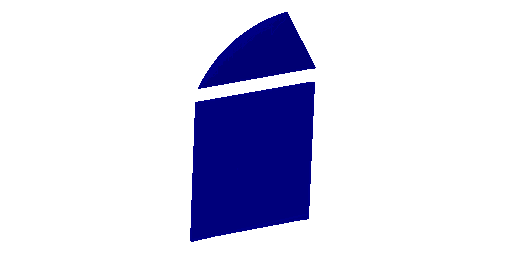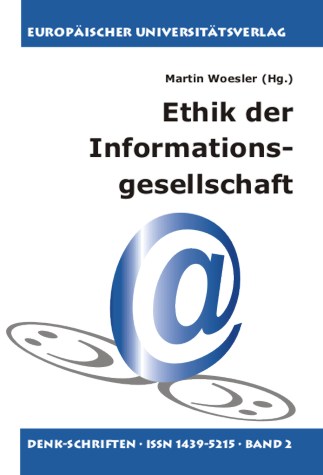[Deutsch]
Publications,
sorted
by
-
Authors
-
Titles
-
Series
-
Date
-
ISBN/ISSN
-
English publ.
-
E-Texts
-
Software
-
Internet publ.
-
Teaching books
Martin Woesler ed.
Ethics of the information society [German]
Privacy and data security, sustainability, compatibility to mankind, society, and nature, conflicts of interest and value, copyright and human right issues
Bochum/Germany: European University Press 2005, 140 pp., 39,90 €, ISBN 3899661648.
Contributors: Dr.-Ing. Peter Brödner, formerly Institut Arbeit und Technik im Wissenschaftszentrum Nordrhein-Westfalen; Dr. Ralf Isenmann, Universität Bremen; Dr. Michael Nagenborg, Universität Karlsruhe; Dr. Raymund Werle, Max-Planck-Institut für Gesellschaftsforschung; Dr. Martin Woesler, Universität Witten/Herdecke.
Available by phone +49 234 701360 or fax 701230, email eup@bou.de, website: http://bou.de/3899661648.html.
Peter Broedner analyzes the „difficult relation“ of computer and work. A growing body of empirical evidence suggests that the use of computer systems in work and value creation processes is rather unproductive in many cases. Systematically the reasons for these deficits are investigated. A theoretical perspective on the semiotic nature of computer systems allows to analyse their social embedding in the sign processes inherent in all kinds of work. Based on these theoretical insights, a number of practical improvements for the design, implemetation and use of computer systems in work processes are derived.
Ralf Isenmann analyzes in his contribution the relatively new goal for development of a sustainable information society, which is emerging at present, with sustainability and information society as its converging elements. This paper introduces the conceptual elements of sustainability and an information society, while bringing to the surface the underlying normative issues. Further, a series of opportunities are presented on how to develop towards a sustainable information society. Lastly, examples of using information and communication technologies from the ‘Memorandum Sustainable Information Society’ are discussed. This publication was recently released by the working group “Sustainable Information Society” of the German Society for Informatics.
Michael Nagenborg examines the change the internet brought to the understanding of data security. The purpose of law based data protection is protecting each individual´s right of privacy. Due to the restrictions coming along with this, some authors favour an interactive idea of privacy. Under current prevailing conditions, a debate on the amount of those data which are worth protecting is not sufficient any more. Just as well, the decision-making processes must be considered on which the collected data are based.
Raymund Werle in his contribution sheds light on the Interest and value conflicts about the protection of intellectual property in the media and software industry. For years the media and software industry has complained about illegal copying and distribution of digital products although the technical and legal means to protect intellectual property have improved significantly. But the global trend towards perfect protection of property invariably continues as we enter the digital era. Trade interests, innovation objectives and also business strategic motives work towards extending and strengthening copyrights and patents. But there are also counter-forces with technical standardization, the open source community and the groups committed to the Internet traditions providing the ideational and social basis. They refer to cultural values and individual freedom, but they also include economic aspects suggesting that stronger and more encompassing protection of intellectual property be detrimental to innovation and therefore disadvantageous to the enterprises and the national economy.
Martin Woesler in his contribution asks, which impact the internet has on the application of human rights. Since mankind is able to influence the ecological and natural balance, it has established an artificial equilibrium of international law and pacts of mutual assistance. One of its elements are the human rights. Its article 19 guarantees the freedom of speech and the unhindered access to information. Information technology provides the today’s media to carry out article 19. The protection of human rights has been improved by the developments of the information technology. At the same time, information technology to a minor degree also provides new facilities to break human rights, e.g. the documentation of murders through Al-Qaida.
The internet as one realization form of information technology has - in spite of its implicit neutrality - a direct, liberalizing effect on restrictive social systems, e.g. on the semi-autoritarian systems in South-East Asia. There, the enforceability of human rights is ameliorating.
You may order within the States or within Europe by email, fax or letter directly from the Press:
US: The University Press Bochum, c/o Ms Lei Song, 2504 Grant Ave #2, Redondo Beach CA 90278 USA, phone +1 310 379-9031, fax +1 209 729-5412, email us@BoU.de
Asia: The University Press Bochum, c/o Intec, Ms. Sylvia Weng, 225 Chaoyang Beilu, Jinglong dasha, 1809 shi, 100026 Beijing, phone +86 10 8595 2711, fax +86 10 8595 2712, email china@BoU.de.
Europe: The University Press Bochum, Querenburger Höhe 281, 44801 Bochum, Germany, phone +49 234 971 978 - 0, fax -6, on campus +49 234 (32-)11993, fax (32-)14993, email BoU@BoU.deThis title is also available through German bookstores, and Amazon.de.

